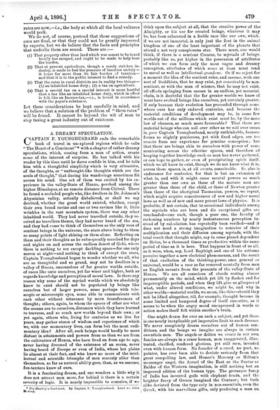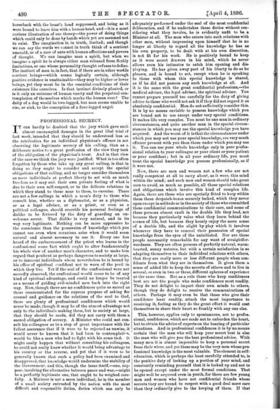A DREAMY SPECULATION.
CAPTAIN F. YOUNGHUSBAND ends the remarkable book of travel in unexplored regions which he calls " The Heart of a Continent"* with a chapter of rather dreamy speculations, which, coming from a man of action, create some of the interest of surprise. He has talked with his reader by this time until he dares confide in him, and he tells him with a thoughtful simplicity which is very attractive, of the thoughts, or " unthought-like thoughts which are the souls of thought," that during his wanderings sometimes flit across his mind. One set of them was excited by his ex- perience in the valley-State of Hunza, perched among the higher Himalayas, at no remote distance from Chitral. There he found a secluded people who, like dwellers in Dr. Johnson's Abyssinian valley, actually disbelieved, or shall we say doubted, whether the great world existed, whether, except their own broad ravine and one or two ravines like it, little wrinkles in the vast mountain system, there was any other inhabited world. They had never travelled outside, they re- ceived no travellers thence, they had never heard of the sea, and they had come to think of themselves as the only race of sentient beings in the universe, the stars above being to them so many points of light shining on them alone. Reflecting on them and their thoughts as he subsequently marched for days and nights on and across the endless desert of Gobi, where there is nothing to see except darkling space—for one only moves at night—and nothing to think of except the stars, Captain Younghnsband began to wonder whether we all, who are so thoughtful and so grand, may not be dwellers in a valley of Hunza, unconscious of far greater worlds outside, of races like unto ourselves, yet far wiser and higher, both as regards knowledge and perception of moral laws. Is there any reason why some of the myriad worlds which we absolutely know to exist should not be populated by beings like ourselves but of larger powers, some perhaps with tele- scopic or microscopic eyes, some able to communicate with each other without utterance by mere transferences of thought; others, again, to whom the spaces of ether are what the oceans are to ourselves, distances which they have learned to traverse, and so reach new worlds beyond their own ; or yet again, others who, living for centuries as we live for years, may gather stores of wisdom and experience of which we, with our momentary lives, can form but the most rudi- mentary idea P After all, such beings would hardly be more distant in attainments and powers from us than we are from the cultivators of Hunza, who have lived on from age to age, never having dreamed of the existence of an ocean, never having heard of Europe or even of India, whose hot plains lie almost at their feet, and who know no more of the intel- lectual and scientific triumphs of men scarcely abler than themselves, so far as natural ability goes, than, as we assume, fox-terriers know of ours.
It is a fascinating dream, and one wonders a little why it does not attract men more, for behind it there is a certain severity of logic. It is nearly impossible to conceive, if we
• Tto Mimi of a Contment. By Captain F. Younghtuband. Load n John Xurroy.
think upon the subject at all, that the creative power of the Almighty, or his use for created beings, whatever it may be, has been exhausted in a feeble race like our own, which, if we are not immortal, is only just the first in the animal kingdom of one of the least important of the planets that attend a not very conspicuous star. There must, one would think, if there is a sentient Creator, be myriads of beings, probably like us, yet higher in the possession of attributes of which we can form only the most vague and dreamy conception, attributes of which some at least must tend to moral as well as intellectual grandeur. Or if we reject for a moment the idea of the sentient ruler, and assume, with one sect of Buddhists, that he may exist, yet conceivably be non- sentient, or with the man of science, that he may not exist, all effects springing from causes in an endless, yet material, chain, is it doubtful that the far greater worlds we know of must have evolved beings like ourselves, yet certainly greater, if only because their evolution has proceeded through mons, where ours has only endured centuries, and because the material conditions of development may be, in some few worlds out of the millions which exist must be, by the mere law of chances, so much more favourable P That there are material beings who can sail over ether as we sail over ocean is, pace Captain Younghusband, nearly unthinkable, because forms so slightly ponderous, yet with fixed edges, are too remote from our experience for genuine conception ; but that there are beings akin to ourselves with power of com- municating across the etherine spaces, and therefore of heaping together knowledge such as man has never gathered, or can hope to gather, or even of precipitating spirit itself, which we all know to exist, though we do not know what it is, across those spaces, is, at all events, conceivable. So also is endurance for centuries, for that is but an extension of what is, and with it might come mental powers as mach. greater than our own as those of the mature man are greater than those of the child, or those of Newton greater than those of the aboriginal Tasmanian, powers, we repeat, which might acquire consciousness of new and higher moral laws as well as of new and more potent laws of physics. It is. probable, if not certain, that to occasional individuals among the myriads who are born and die exceptional gifts are vouchsafed—one such, though a poor one, the faculty of reckoning numbers by nearly instantaneous perception in- stead of by calculation, has repeatedly been verified—and it does not need a strong imagination to conceive of their
multiplication and their diffusion among myriads, with the total result that thought might, say in some planet dependent on Sirius, be a thousand times as productive within the same period of time as it is here. That happens in front of us all,
as it were, when, say, Lord Rayleigh and one of his artisans perceive together a new electrical phenomenon, and the result
of that exaltation of the thinking-power, once general or universal, would be a race as far removed mentally from men as English savants from the peasants of the valley-State of Hunza. We are all conscious of clouds resting almost permanently on the mind, which yet lift by flashes and for- imperceptible periods, and when they lift give us glimpses of what, under altered conditions, we might be, and why in other worlds—material worlds, we mean, like this—should they not be lifted altogether, till, for example, thought became in some limited and hampered degree of itself executive, as it seems to be when the angry mood unexpressed in words or action makes itself felt within another's brain.
One might dream for ever on such a subject, and yet there is one nearly inexplicable yet imperative limit to such dreams. We never completely dream ourselves out of human con- ditions, and the beings we imagine are always in certain essentials men. The angels or deities we create in our own fancies are always in a sense human, men exaggerated, illus- trated, clarified, rendered glorious, yet still men, invested even with human form. No founder of a creed, no poet, no• painter, has ever been able to deviate seriously from that great compelling law, and Homer's Mercury or Milton's messenger angel, the Azrael of the East or the Surtur or Balder of the Western imagination, is still nothing but an improved edition of the human type. The grotesque fancy of India has invented gods with elephant heads, and the brighter fancy of Greece imagined the Centaur; but both alike deviated from the type only in non-essentials, even the Greek, with his marvellous gifts, only producing a man on
horseback with the beast's bead suppressed, and being as it were bound to leave him with a human head, and—it is a most curious illustration of our theory—the power of doing things which could only be done by hands which yet are assumed not to exist. The imagination is, in truth, limited; and though we can say the words we cannot in truth think of a sentient emerald, or of a race of ants with human affections and powers of thought. We can imagine man a spirit, but when we imagine a spirit he is always either man released from fleshly limitations, or one whose personality thought refuses to define. The instinct of man is, in fact, that if there are in other worlds sentient beings—which seems logically certain, although positive evidence is unattainable—they may be higher or lower beings, yet they must be in the essential conditions of their existence like ourselves. Is that instinct divinely planted, or is it only an outcome of human vanity and the perpetual con- templation of themselves which marks the human race? The deity of a dog would be two-legged, but man seems unable to rise, or sink, to the conception of a four-legged angel.



































 Previous page
Previous page